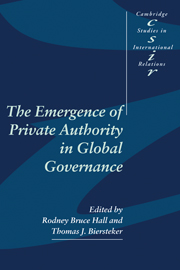Book contents
- Frontmatter
- Contents
- List of figures
- List of tables
- List of contributors
- Preface and acknowledgements
- Part I Introduction: theorizing private authority
- Part II Market authority: globalization and “globaloney”
- Part III Moral authority: global civil society and transnational religious movements
- Part IV Illicit authority: mafias and mercenaries
- Part V Conclusions and directions
- 10 Private authority as global governance
- Bibliography
- Index
- CAMBRIDGE STUDIES IN INTERNATIONAL RELATIONS
10 - Private authority as global governance
Published online by Cambridge University Press: 22 September 2009
- Frontmatter
- Contents
- List of figures
- List of tables
- List of contributors
- Preface and acknowledgements
- Part I Introduction: theorizing private authority
- Part II Market authority: globalization and “globaloney”
- Part III Moral authority: global civil society and transnational religious movements
- Part IV Illicit authority: mafias and mercenaries
- Part V Conclusions and directions
- 10 Private authority as global governance
- Bibliography
- Index
- CAMBRIDGE STUDIES IN INTERNATIONAL RELATIONS
Summary
Private locations of authority have begun to influence a growing number of issues in our contemporary world. Authoritative private actors are not only important players in the international political economy; they are increasingly beginning to play a critical role in the governance of other important spheres of social and political life. They are engaged in the establishment of standards, the provision of social welfare, the enforcement of contracts, and the maintenance of security. The essays in this volume illustrate well the extent of the phenomenon, its complex character, the controversies surrounding its definition, and some of its implications. While the very meanings of the “private,” of “authority,” and of “private authority” themselves remain controversial, we think we have made some important progress in our understanding of these phenomena.
Rather than define the realm of the private in an abstract, theoretical sense, most of the contributors to this volume define the private sector in terms of what it is not. For Claire Cutler, private actors are increasingly engaged in authoritative decision-making that was previously the prerogative of sovereign states, while for Saskia Sassen the domain of the private is taking over functions once enclosed in national legal frameworks. Ronnie Lipschutz and Cathleen Fogel differentiate the private sector from the public, while Mark Juergensmeyer locates it in opposition to the government. Thus, whether it is differentiated from the sovereign state, the government, the national legal framework, or the public sector, the private sector is typically defined in terms of some residual of the national state.
- Type
- Chapter
- Information
- The Emergence of Private Authority in Global Governance , pp. 203 - 222Publisher: Cambridge University PressPrint publication year: 2002
- 18
- Cited by

